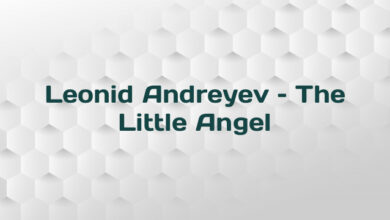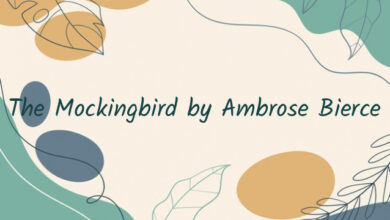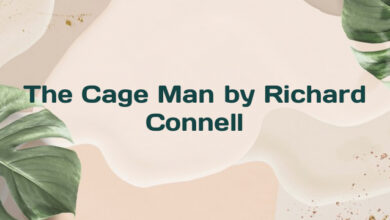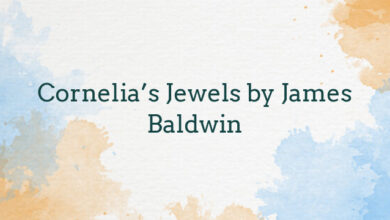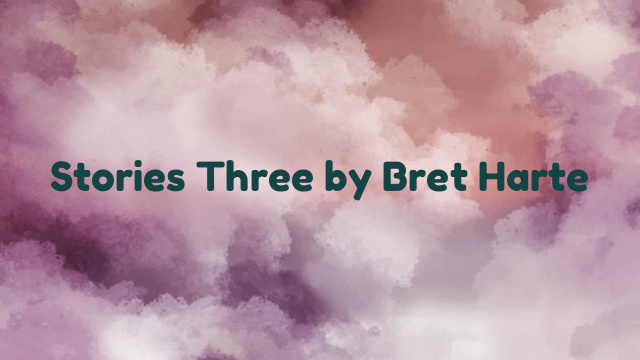
Stories Three by Bret Harte
I
FOR SIMLA REASONS
Some people say that improbable things don’t necessarily happen in India–but these people never find improbabilities anywhere. This sounds clever, but you will at once perceive that it really means the opposite of what I intended to say. So we’ll drop it. What I am trying to tell you is that after Sparkley had that affair with Miss Millikens a singular change came over him. He grew abstracted and solitary,–holding dark seances with himself,–which was odd, as everybody knew he never cared a rap for the Millikens girl. It was even said that he was off his head–which is rhyme. But his reason was undoubtedly affected, for he had been heard to mutter incoherently at the Club, and, strangest of all, to answer questions THAT WERE NEVER ASKED! This was so awkward in that Branch of the Civil Department of which he was a high official– where the rule was exactly the reverse–that he was presently invalided on full pay! Then he disappeared. Clever people said it was because the Department was afraid he had still much to answer for; stupid people simply envied him.
Mrs. Awksby, whom everybody knew had been the cause of breaking off the match, was now wild to know the reason of Sparkley’s retirement. She attacked heaven and earth, and even went a step higher–to the Viceroy. At the vice-regal ball I saw, behind the curtains of a window, her rolling violet-blue eyes with a singular glitter in them. It was the reflection of the Viceroy’s star, although the rest of his Excellency was hidden in the curtain. I heard him saying, “Come now! really, now, you are–you know you are!” in reply to her cooing questioning. Then she made a dash at me and captured me.
“What did you hear?”
“Nothing I should not have heard.”
“Don’t be like all the other men–you silly boy!” she answered. “I was only trying to find out something about Sparkley. And I will find it out too,” she said, clinching her thin little hand. “And what’s more,” she added, turning on me suddenly, “YOU shall help me!”
“I?” I said in surprise.
“Don’t pretend!” she said poutingly. “You’re too clever to believe he’s cut up over the Millikens. No–it’s something awful or– another woman! Now, if I knew as much of India as you do–and wasn’t a woman, and could go where I liked–I’d go to Bungloore and find him.”
“Oh! You have his address?” I said.
“Certainly! What did you expect I was behind the curtain with the Viceroy for?” she said, opening her violet eyes innocently. “It’s Bungloore–First Turning to the Right–At the End of the passage.”
Bungloore–near Ghouli Pass–in the Jungle! I knew the place, a spot of dank pestilence and mystery. “You never could have gone there,” I said.
“You do not know WHAT I could do for a FRIEND,” she said sweetly, veiling her eyes in demure significance.
“Oh, come off the roof!” I said bluntly.
She could be obedient when it was necessary. She came off. Not without her revenge. “Try to remember you are not at school with the Stalkies,” she said, and turned away.
I went to Bungloore,–not on her account, but my own. If you don’t know India, you won’t know Bungloore. It’s all that and more. An egg dropped by a vulture, sat upon and addled by the Department. But I knew the house and walked boldly in. A lion walked out of one door as I came in at another. We did this two or three times– and found it amusing. A large cobra in the hall rose up, bowed as I passed, and respectfully removed his hood.
I found the poor old boy at the end of the passage. It might have been the passage between Calais and Dover,–he looked so green, so limp and dejected. I affected not to notice it, and threw myself in a chair.
He gazed at me for a moment and then said, “Did you hear what the chair was saying?”
It was an ordinary bamboo armchair, and had creaked after the usual fashion of bamboo chairs. I said so.
He cast his eyes to the ceiling. “He calls it ‘creaking,'” he murmured. “No matter,” he continued aloud, “its remark was not of a complimentary nature. It’s very difficult to get really polite furniture.”
The man was evidently stark, staring mad. I still affected not to observe it, and asked him if that was why he left Simla.
“There were Simla reasons, certainly,” he replied. “But you think I came here for solitude! SOLITUDE!” he repeated, with a laugh. “Why, I hold daily conversations with any blessed thing in this house, from the veranda to the chimney-stack, with any stick of furniture, from the footstool to the towel-horse. I get more out of it than the gabble at the Club. You look surprised. Listen! I took this thing up in my leisure hours in the Department. I had read much about the conversation of animals. I argued that if animals conversed, why shouldn’t inanimate things communicate with each other? You cannot prove that animals don’t converse–neither can you prove that inanimate objects DO NOT. See?”
I was thunderstruck with the force of his logic.
“Of course,” he continued, “there are degrees of intelligence, and that makes it difficult. For instance, a mahogany table would not talk like a rush-bottomed kitchen chair.” He stopped suddenly, listened, and replied, “I really couldn’t say.”
“I didn’t speak,” I said.
“I know YOU didn’t. But your chair asked me ‘how long that fool was going to stay.’ I replied as you heard. Pray don’t move–I intend to change that chair for one more accustomed to polite society. To continue: I perfected myself in the language, and it was awfully jolly at first. Whenever I went by train, I heard not only all the engines said, but what every blessed carriage thought, that joined in the conversation. If you chaps only knew what rot those whistles can get off! And as for the brakes, they can beat any mule driver in cursing. Then, after a time, it got rather monotonous, and I took a short sea trip for my health. But, by Jove, every blessed inch of the whole ship–from the screw to the bowsprit–had something to say, and the bad language used by the garboard strake when the ship rolled was something too awful! You don’t happen to know what the garboard strake is, do you?”
“No,” I replied.
“No more do I. That’s the dreadful thing about it. You’ve got to listen to chaps that you don’t know. Why, coming home on my bicycle the other day there was an awful row between some infernal ‘sprocket’ and the ‘ball bearings’ of the machine, and I never knew before there were such things in the whole concern.
I thought I had got at his secret, and said carelessly: “Then I suppose this was the reason why you broke off your engagement with Miss Millikens?”
“Not at all,” he said coolly. “Nothing to do with it. That is quite another affair. It’s a very queer story; would you like to hear it?”
“By all means.” I took out my notebook.
“You remember that night of the Amateur Theatricals, got up by the White Hussars, when the lights suddenly went out all over the house?”
“Yes,” I replied, “I heard about it.”
“Well, I had gone down there that evening with the determination of proposing to Mary Millikens the first chance that offered. She sat just in front of me, her sister Jane next, and her mother, smart Widow Millikens,–who was a bit larky on her own account, you remember,–the next on the bench. When the lights went out and the panic and tittering began, I saw my chance! I leaned forward, and in a voice that would just reach Mary’s ear I said, ‘I have long wished to tell you how my life is bound up with you, dear, and I never, never can be happy without you’–when just then there was a mighty big shove down my bench from the fellows beyond me, who were trying to get out. But I held on like grim death, and struggled back again into position, and went on: ‘You’ll forgive my taking a chance like this, but I felt I could no longer conceal my love for you,’ when I’m blest if there wasn’t another shove, and though I’d got hold of her little hand and had a kind of squeeze in return, I was drifted away again and had to fight my way back. But I managed to finish, and said, ‘If the devotion of a lifetime will atone for this hurried avowal of my love for you, let me hope for a response,’ and just then the infernal lights were turned on, and there I was holding the widow’s hand and she nestling on my shoulder, and the two girls in hysterics on the other side. You see, I never knew that they were shoved down on their bench every time, just as I was, and of course when I got back to where I was I’d just skipped one of them each time! Yes, sir! I had made that proposal in THREE sections–a part to each girl, winding up with the mother! No explanation was possible, and I left Simla next day. Naturally, it wasn’t a thing they could talk about, either!”
“Then you think Mrs. Awksby had nothing to do with it?” I said.
“Nothing–absolutely nothing. By the way, if you see that lady, you might tell her that I have possession of that brocade easy- chair which used to stand in the corner of her boudoir. You remember it,–faded white and yellow, with one of the casters off and a little frayed at the back, but rather soft-spoken and amiable? But of course you don’t understand THAT. I bought it after she moved into her new bungalow.”
“But why should I tell her that?” I asked in wonder.
“Nothing–except that I find it very amusing with its reminiscences of the company she used to entertain, and her confidences generally. Good-by–take care of the lion in the hall. He always couches on the left for a spring. Ta-ta!”
I hurried away. When I returned to Simla I told Mrs. Awksby of my discoveries, and spoke of the armchair.
I fancied she colored slightly, but quickly recovered.
“Dear old Sparkley,” she said sweetly; “he WAS a champion liar!”
II
A PRIVATE’S HONOR
I had not seen Mulledwiney for several days. Knowing the man–this looked bad. So I dropped in on the Colonel. I found him in deep thought. This looked bad, too, for old Cockey Wax–as he was known to everybody in the Hill districts but himself–wasn’t given to thinking. I guessed the cause and told him so.
“Yes,” he said wearily, “you are right! It’s the old story. Mulledwiney, Bleareyed, and Otherwise are at it again,–drink followed by Clink. Even now two corporals and a private are sitting on Mulledwiney’s head to keep him quiet, and Bleareyed is chained to an elephant.”
“Perhaps,” I suggested, “you are unnecessarily severe.”
“Do you really think so? Thank you so much! I am always glad to have a civilian’s opinion on military matters–and vice versa–it broadens one so! And yet–am I severe? I am willing, for instance, to overlook their raid upon a native village, and the ransom they demanded for a native inspector! I have overlooked their taking the horses out of my carriage for their own use. I am content also to believe that my fowls meekly succumb to jungle fever and cholera. But there are some things I cannot ignore. The carrying off of the great god Vishnu from the Sacred Shrine at Ducidbad by The Three for the sake of the priceless opals in its eyes”–
“But I never heard of THAT,” I interrupted eagerly. “Tell me.”
“Ah!” said the Colonel playfully, “that–as you so often and so amusingly say–is ‘Another Story’! Yet I would have overlooked the theft of the opals if they had not substituted two of the Queen’s regimental buttons for the eyes of the god. This, while it did not deceive the ignorant priests, had a deep political and racial significance. You are aware, of course, that the great mutiny was occasioned by the issue of cartridges to the native troops greased with hog’s fat–forbidden by their religion.”
“But these three men could themselves alone quell a mutiny,” I replied.
The Colonel grasped my hand warmly. “Thank you. So they could. I never thought of that.” He looked relieved. For all that, he presently passed his hand over his forehead and nervously chewed his cheroot.
“There is something else,” I said.
“You are right. There is. It is a secret. Promise me it shall go no further–than the Press? Nay, swear that you will KEEP it for the Press!”
“I promise.”
“Thank you SO much. It is a matter of my own and Mulledwiney’s. The fact is, we have had a PERSONAL difficulty.” He paused, glanced around him, and continued in a low, agitated voice: “Yesterday I came upon him as he was sitting leaning against the barrack wall. In a spirit of playfulness–mere playfulness, I assure you, sir–I poked him lightly in the shoulder with my stick, saying ‘Boo!’ He turned–and I shall never forget the look he gave me.”
“Good heavens!” I gasped, “you touched–absolutely TOUCHED– Mulledwiney?”
“Yes,” he said hurriedly, “I knew what you would say; it was against the Queen’s Regulations–and–there was his sensitive nature which shrinks from even a harsh word; but I did it, and of course he has me in his power.”
“And you have touched him?” I repeated,–“touched his private honor!”
“Yes! But I shall atone for it! I have already arranged with him that we shall have it out between ourselves alone, in the jungle, stripped to the buff, with our fists–Queensberry rules! I haven’t fought since I stood up against Spinks Major–you remember old Spinks, now of the Bombay Offensibles?–at Eton.” And the old boy pluckily bared his skinny arm.
“It may be serious,” I said.
“I have thought of that. I have a wife, several children, and an aged parent in England. If I fall, they must never know. You must invent a story for them. I have thought of cholera, but that is played out; you know we have already tried it on The Boy who was Thrown Away. Invent something quiet, peaceable and respectable–as far removed from fighting as possible. What do you say to measles?”
“Not half bad,” I returned.
“Measles let it be, then! Say I caught it from Wee Willie Winkie. You do not think it too incredible?” he added timidly.
“Not more than YOUR story,” I said.
He grasped my hand, struggling violently with his emotion. Then he struggled with me–and I left hurriedly. Poor old boy! The funeral was well attended, however, and no one knew the truth, not even myself.
III
JUNGLE FOLK
It was high noon of a warm summer’s day when Moo Kow came down to the watering-place. Miaow, otherwise known as “Puskat”–the warmth-loving one–was crouching on a limb that overhung the pool, sunning herself. Brer Rabbit–but that is Another Story by Another Person.
Three or four Gee Gees, already at the pool, moved away on the approach of Moo Kow.
“Why do ye stand aside?” said the Moo Kow.
“Why do you say ‘ye’?” said the Gee Gees together.
“Because it’s more impressive than ‘you.’ Don’t you know that all animals talk that way in English?” said the Moo Kow.
“And they also say ‘thou,’ and don’t you forget it!” interrupted Miaow from the tree. “I learnt that from a Man Cub.”
The animals were silent. They did not like Miaow’s slang, and were jealous of her occasionally sitting on a Man Cub’s lap. Once Dun- kee, a poor relation of the Gee Gees, had tried it on, disastrously–but that is also Another and a more Aged Story.
“We are ridden by The English–please to observe the Capital letters,” said Pi Bol, the leader of the Gee Gees, proudly. “They are a mighty race who ride anything and everybody. D’ye mind that– I mean, look ye well to it!”
“What should they know of England who only England know?” said Miaow.
“Is that a conundrum?” asked the Moo Kow.
“No; it’s poetry,” said the Miaow.
“I know England,” said Pi Bol prancingly. “I used to go from the Bank to Islington three times a day–I mean,” he added hurriedly, “before I became a screw–I should say, a screw-gun horse.”
“And I,” said the Moo Kow, “am terrible. When the young women and children in the village see me approach they fly shriekingly. My presence alone has scattered their sacred festival–The Sundes Kool Piknik. I strike terror to their inmost souls, and am more feared by them than even Kreep-mows, the insidious! And yet, behold! I have taken the place of the mothers of men, and I have nourished the mighty ones of the earth! But that,” said the Moo Kow, turning her head aside bashfully, “that is Anudder Story.”
A dead silence fell on the pool.
“And I,” said Miaow, lifting up her voice, “I am the horror and haunter of the night season. When I pass like the night wind over the roofs of the houses men shudder in their beds and tremble. When they hear my voice as I creep stealthily along their balconies they cry to their gods for succor. They arise, and from their windows they offer me their priceless household treasures–the sacred vessels dedicated to their great god Shiv–which they call ‘Shivin Mugs’–the Kloes Brosh, the Boo-jak, urging me to fly them! And yet,” said Miaow mournfully, “it is but my love-song! Think ye what they would do if I were on the war-path.”
Another dead silence fell on the pool. Then arose that strange, mysterious, indefinable Thing, known as “The Scent.” The animals sniffed.
“It heralds the approach of the Stalkies–the most famous of British Skool Boaz,” said the Moo Kow. “They have just placed a decaying guinea-pig, two white mice in an advanced state of decomposition, and a single slice of Limburger cheese in the bed of their tutor. They had previously skillfully diverted the drains so that they emptied into the drawing-room of the head-master. They have just burned down his house in an access of noble zeal, and are fighting among themselves for the spoil. Hark! do ye hear them?”
A wild medley of shrieks and howls had arisen, and an irregular mob of strange creatures swept out of the distance toward the pool. Some were like pygmies, some had bloody noses. Their talk consisted of feverish, breathless ejaculations,–a gibberish in which the words “rot,” “oach,” and “giddy” were preeminent. Some were exciting themselves by chewing a kind of “bhang” made from the plant called pappahmint; others had their faces streaked with djam.
“But who is this they are ducking in the pool?” asked Pi Bol.
“It is one who has foolishly and wantonly conceived that his parents have sent him here to study,” said the Moo Kow; “but that is against the rules of the Stalkies, who accept study only as a punishment.”
“Then these be surely the ‘Bander Log’–the monkey folk–of whom the good Rhuddyidd has told us,” said a Gee Gee–“the ones who have no purpose–and forget everything.”
“Fool!” said the Moo Kow. “Know ye not that the great Rhuddyidd has said that the Stalkies become Major-Generals, V. C.’s, and C. B’s of the English? Truly, they are great. Look now; ye shall see one of the greatest traits of the English Stalky.”
One of the pygmy Stalkies was offering a bun to a larger one, who hesitated, but took it coldly.
“Behold! it is one of the greatest traits of this mighty race not to show any emotion. He WOULD take the bun–he HAS taken it! He is pleased–but he may not show it. Observe him eat.”
The taller Stalky, after eating the bun, quietly kicked the giver, knocked off his hat, and turned away with a calm, immovable face.
“Good!” said the Moo Kow. “Ye would not dream that he was absolutely choking with grateful emotion?”
“We would not,” said the animals.
“But why are they all running back the way they came?” asked Pi Bol.
“They are going back to punishment. Great is its power. Have ye not heard the gospel of Rhuddyidd the mighty? ‘Force is everything! Gentleness won’t wash, courtesy is deceitful. Politeness is foreign. Be ye beaten that ye may beat. Pass the kick on.'”
But here he was interrupted by the appearance of three soldiers who were approaching the watering-place.
“Ye are now,” said the Moo Kow, “with the main guard. The first is Bleareyed, who carries a raven in a cage, which he has stolen from the wife of a deputy commissioner. He will paint the bird snow white and sell it as a dove to the same lady. The second is Otherwise, who is dragging a small garden engine, of which he has despoiled a native gardener, whom he has felled with a single blow. The third is Mulledwiney, swinging a cut-glass decanter of sherry which he has just snatched from the table of his colonel. Mulledwiney and Otherwise will play the engine upon Bleareyed, who is suffering from heat apoplexy and djim-djams.”
The three soldiers seated themselves in the pool.
“They are going to tell awful war stories now,” said the Moo Kow, “stories that are large and strong! Some people are shocked– others like ’em.”
Then he that was called Mulledwiney told a story. In the middle of it Miaow got up from the limb of the tree, coughed slightly, and put her paw delicately over her mouth. “You must excuse me,” she said faintly. “I am taken this way sometimes–and I have left my salts at home. Thanks! I can get down myself!” The next moment she had disappeared, but was heard coughing in the distance.
Mulledwiney winked at his companions and continued his story:–
“Wid that we wor in the thick av the foight. Whin I say ‘thick’ I mane it, sorr! We wor that jammed together, divil a bit cud we shoot or cut! At fur-rest, I had lashed two mushkits together wid the baynits out so, like a hay fork, and getting the haymaker’s lift on thim, I just lifted two Paythians out–one an aych baynit– and passed ’em, aisy-like, over me head to the rear rank for them to finish. But what wid the blud gettin’ into me ois, I was blinded, and the pressure kept incraysin’ until me arrums was thrussed like a fowl to me sides, and sorra a bit cud I move but me jaws!”
“And bloomin’ well you knew how to use them,” said Otherwise.
“Thrue for you–though ye don’t mane it!” said Mulledwiney, playfully tapping Otherwise on the head with a decanter till the cut glass slowly shivered. “So, begorra! there wor nothing left for me to do but to ATE thim! Wirra! but it was the crooel worruk.”
“Excuse me, my lord,” interrupted the gasping voice of Pi Bol as he began to back from the pool, “I am but a horse, I know, and being built in that way–naturally have the stomach of one–yet, really, my lord, this–er”– And his voice was gone.
The next moment he had disappeared. Mulledwiney looked around with affected concern.
“Save us! But we’ve cleaned out the Jungle! Sure, there’s not a baste left but ourselves!”
It was true. The watering-place was empty. Moo Kow, Miaow, and the Gee Gees had disappeared. Presently there was a booming crash and a long, deep rumbling among the distant hills. Then they knew they were near the old Moulmein Pagoda, and the dawn had come up like thunder out of China ‘cross the bay. It always came up that way there. The strain was too great, and day was actually breaking.
